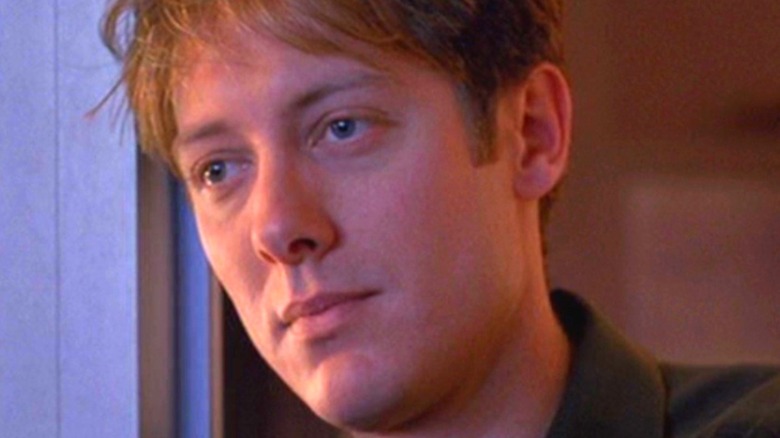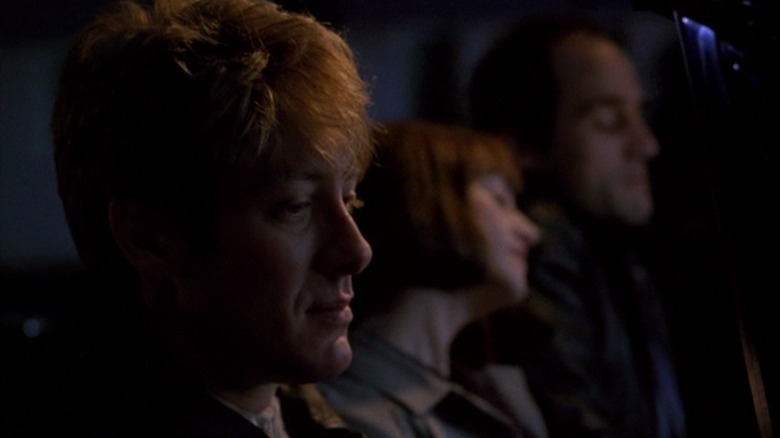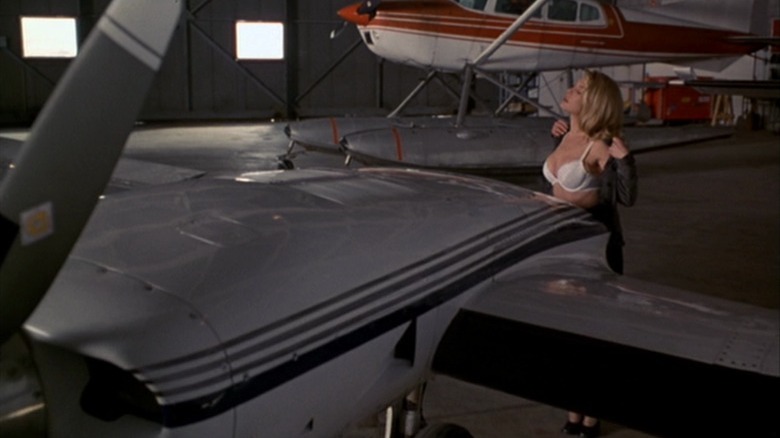Why Was Crash Rated NC-17?
At this point, it goes without saying that any given David Cronenberg movie is guaranteed to mess you up. There's a reason the Canadian master of body horror has been so successful at establishing a brand that his name even became a common adjective in critical parlance — "Cronenbergian" this, "Cronenbergian" that. The reason, simply put, is that David Cronenberg doesn't hold back: His films take their alarming, out-there concepts and push them as far as they can feasibly be pushed. From "Videodrome" to "The Fly," from "Dead Ringers" to "eXistenZ," from "Scanners" to "Naked Lunch," leaving no thematic stone unturned and no taboo unconfronted is the house guarantee.
Cronenberg's proclivity for extreme, singularly discomfiting comfit has once again become the talk of the town with the release of his star-studded latest, "Crimes of the Future," which places Viggo Mortensen, Kristen Stewart, and Léa Seydoux into a synthesized, trans-humanist tomorrow in which "surgery is the new sex." Even the film's trailer, with its bizarre images of surgically altered bodies and implied violations of flesh, is a tough watch to stomach. And yet, somehow, "Crimes of the Future" got off with "just" an R rating in the USA. So imagine what a Cronenberg movie needs to look like to get slapped with an NC-17.
And yet, that's just what happened when the MPAA saw the original cut of "Crash," Cronenberg's 1996 cult classic psychological thriller. What was it about "Crash," exactly, that merited that rare, financially poisonous (via NPR) adults-only rating?
Crash featured sex too explicit for the MPAA's liking
In typical Cronenbergian — there's that word again! — fashion, "Crash" tells the intense story of James (James Spader) and Catherine Ballard (Deborah Kara Unger), a married couple who plunge into a subculture of people who get sexually aroused by being involved in car accidents. "Crash" was originally rated NC-17 for "numerous explicit sex scenes" (via RogerEbert.com), and released just that way in American theaters, but Cronenberg eventually oversaw a new cut with eight minutes of footage excised so the movie could get an R-rated DVD release (via NOW). Hilariously, that cut merited a much grislier MPAA description: "Rated R for accident gore, some graphic language and aberrant sexual content."
That difference between the two blurbs gives us the big clue as to what was so scandalous about the NC-17 cut: The sex in it is much more striking. Comparing the two cuts side-by-side, it's clear that what the MPAA took issue with were all the little moments that made the film's sexuality more "explicit." Among the shots or moments cut from the DVD version include a man kissing Catherine's genitalia; the motion of Catherine's hand masturbating James under a blanket; James, Gabrielle (Rosanna Arquette), and Helen (Holly Hunter) fondling each other while watching TV; Vaughan (Elias Koteas) masturbating Catherine during sex; and Catherine's hand covered in sperm. In general, the sex scenes get rejiggered to be shorter and feature less clear nudity and/or thrusting. As for the violence? No edits.
The MPAA's criteria for giving out NC-17 ratings has long been questioned
What is most clearly demonstrated by a comparison between the two cuts of "Crash" is that the MPAA was less bothered by the film's violence, taboo subjects, and psychologically harrowing themes than by the fact that it created the illusion of watching people actually having sex. The R-rated "Crash" maintains the sex scenes' shocking context but engages in all the "discretion cuts" common to most American films with sexual content, leaving the physicality and emotional import of scenes just ambiguous and vague enough to avoid any impression of "real sex."
Cronenberg himself was allegedly not happy with the need for those edits. In a recent New Yorker profile, his daughter Caitlin revealed, "My dad would speak openly at the dinner table about about [sic] how much sex there was in 'Crash' or how frustrated he was that it was going to be given an NC-17 rating. He told us about how he didn't want to change anything, because 'F*** the censors.'"
It wasn't the first time controversy was sparked by the MPAA's murky regulations around R-rated sex scenes, which reportedly include such prudish, arbitrary mores as keeping thrusting to a minimum, favoring sex between married couples, and banning genitalia unless it's blink-and-you'll-miss-it (via The Hollywood Reporter). It would seem that the guiding ethos of Cronenberg's filmography still holds true: There are plenty of taboos left to turn in Hollywood.


